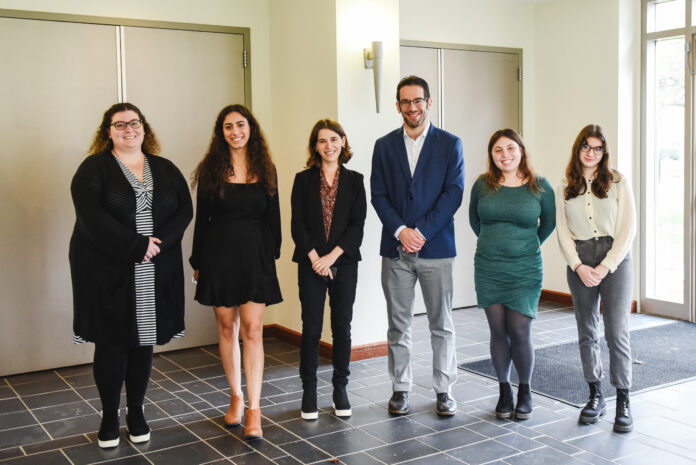
Muhlenberg College welcomed a wide array of speakers to its Hunger Free Campus Symposium on Oct. 24 in Moyer Hall. The event was organized by the College’s chapter of Challah for Hunger, a non-profit based in Jewish values with a mission of minimizing food insecurity, and featured several politicians, activists and student leaders. Speakers included Congresswoman Susan Wild, Governor Tom Wolf, First Lady Frances Wolf, Senator Bob Casey, Representative Malcolm Kenyatta, Representative Mike Schlossberg ‘05, Joel Berg (food insecurity activist), and Krystal Hall ‘21. These individuals spoke on the need to address food insecurity among college students through public policy and legislation.
Food insecurity, while rarely discussed in relation to university students, is a major issue. In his video remarks, Senator Bob Casey noted that “more than a third of students who responded [to a nationwide college survey] reported experiencing food insecurity.” The need for food among these individuals was only exacerbated by the COVID-19 pandemic which put a strain on many students’ incomes.
Some of the guests shared personal stories of food insecurity while in higher education. State representative for Pennsylvania’s 181st district Kenyatta is currently leading the charge on Pennsylvania’s version of a Hunger Free Campus Bill. His passion is driven by his personal collegiate experience. Kenyatta stated, “When I was in school I remember not having enough meals on my meal plan… to really sustain me through the week.”
“more than a third of students who responded [to a nationwide college survey] reported experiencing food insecurity.”
Congresswoman for Pennsylvania’s seventh district Wild spoke in-person about her similar struggles. “Signing up for the meal plan in college was not an option for me. It was all I could do to get those tuition payments and buy my books, let alone paying for what seemed like an extravagant meal plan.” She noted that relying on philanthropy alone is not the way to go about solving this issue. Substantive policy change is needed, and according to Wild, “The issues we’re talking about today are very much affected by your choice of elected officials.”
Addressing issues adjacent to the topic of hunger was an important facet of the event. State representative for Pennsylvania’s 132nd district Schlossberg has observed a “tendency in public policy to look at things from a myopic perspective.” Schlossberg, a big proponent of mental health care, cited a study that found that for every dollar the minimum wage is raised, suicide rates decrease by one percent. This demonstrates the domino effect that solving related issues can have on the food insecurity problem facing college students.
Schlossberg stated that, “We do fundamentally need systemic change.” Pennsylvania’s First Lady Wolf, expressed similar sentiments in her personalized video. “This is the result of systemic issues like inequity, poverty and the lack of opportunity. And these issues run deep.” She advocated for a multifaceted solution to food insecurity in Pennsylvania’s institutions of higher education. Wolf outlined her plan saying, “That means addressing the astronomical cost of higher education, strengthening our social safety net, ensuring fair wages for all, increasing access to quality health care, improving our transportation systems, addressing climate change and making equitable investments in education.”
One major piece of legislation being advocated for by many of the event’s guests was the EATS (Enhance Access To SNAP [Supplemental Nutrition Assistance Program]) Act of 2021. The bill states that it will work to “amend the Food and Nutrition Act of 2008 to treat attendance at an institution of higher education the same as work for the purpose of determining eligibility to participate in the supplemental nutrition assistance program.” This means that students will no longer have to hold a job alongside their course obligations in order to qualify for food assistance, which is a current restriction of SNAP benefits.
“That means addressing the astronomical cost of higher education, strengthening our social safety net, ensuring fair wages for all, increasing access to quality health care, improving our transportation systems, addressing climate change and making equitable investments in education.”
President of Muhlenberg’s chapter of Challah for Hunger Natalie David ‘22 expressed her reasoning for spearheading the event saying, “To create change, you have to believe you can. I wanted to empower my peers to create legislative change on issues that directly impact our collective health and well-being. Each student has the capability to create change and there is power in numbers. By building coalitions of educated, passionate individuals, we can help our vision of a more equitable college experience become reality.”
“I enjoyed attending the Symposium because it gives me comfort to know that we have the power to make change and end hunger on more than just Muhlenberg’s campus,” remarked Isabella Trauger ‘23. “Co-leading the Food Recovery Network has given me the opportunity to make a change in the Lehigh Valley, and this symposium has inspired my co-president and I to continue to find ways to end hunger on campus!”
Alex Wagner ‘22 was in agreement, stating, “Rarely is hunger looked at through the lens of a college campus. I feel like many people do not see it like that and it’s something that desperately needs to be brought to the front. Representative Schlossberg made a great connection with hunger and mental health by drawing from his own experiences. As someone who has had his own struggles, that part really hit home for me.”
For those that want to advocate for the passage of legislation that would provide for food insecure students, the primary course of action as outlined by many speakers is to contact your local legislators. Wild stressed the importance of taking action saying,“Stay engaged. Call your legislators, demand to know what their position is on things, make sure that they know what your position is. It really, really does make a difference. And if it doesn’t make a difference to your elected official then you’ve got the wrong elected official, and you need to vote them out.”
Katie is a Media & Communication and Political Science double major in the class of 2024. When she's not working on the paper you can find her blasting Taylor Swift, reading Jane Austen, or crying over Little Women (2019).






















